Hi there, fellow dog parent! I’m Dr. Candy Akers, a holistic veterinarian with a particular interest in breed-specific health issues, like Yorkshire Terrier Eye Health. If you’re a pet parent to a Yorkshire Terrier, you’re probably well aware of their unique charm and spirited personality. However, you might also be aware that these little bundles of joy are prone to specific eye health issues.
Understanding the eye structure of a Yorkshire Terrier, the common eye problems they face, and the vet-recommended solutions can help ensure your furry friend leads a healthy, happy life. In this article, we’ll explore the common eye conditions in Yorkshire Terriers, preventive measures you can take, and the importance of routine eye care and maintenance. We’ll also discuss the role of diet and environmental hygiene in maintaining your terrier’s eye health.
Whether you’re dealing with Yorkshire Terrier Eye Diseases or just want to learn more about Yorkshire Terrier Eye Care, I’m here to provide the information you need. So, let’s get started on this journey towards better understanding and caring for your Yorkshire Terrier’s eyes!
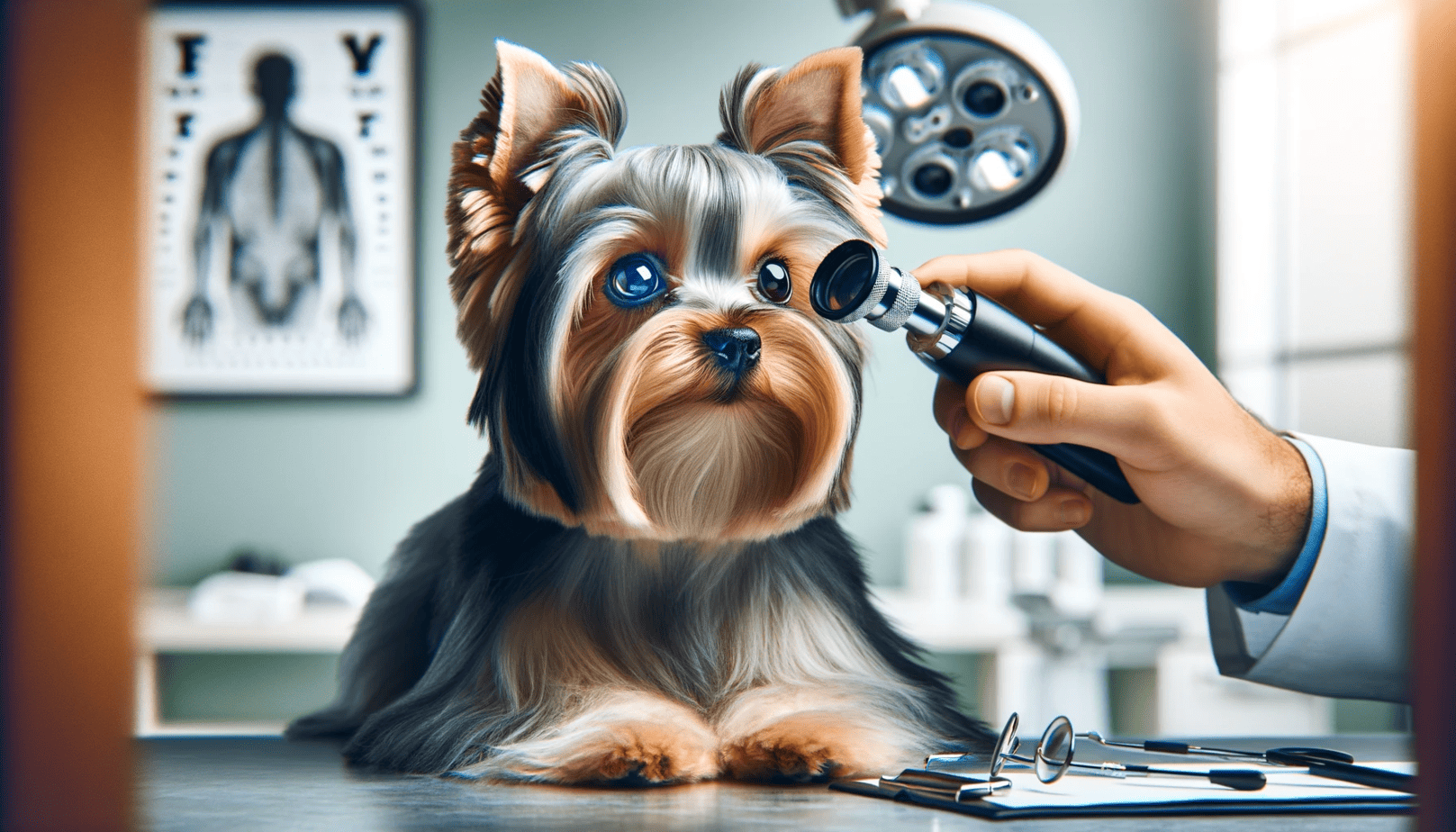
Understanding Rottweiler Specific Eye Structure
Unlocking the secrets of your Yorkshire Terrier’s unique eye structure is an essential first step in maintaining their overall eye health. This knowledge will empower you to detect any abnormalities early, and seek out the most effective vet solutions for Yorkshire Terrier eye problems.
Yorkshire Terriers, fondly known as Yorkies, possess a pair of expressively large and bright eyes that significantly contribute to their endearing appearance. However, these beautiful eyes are not just for show; they serve a vital role in their daily activities and overall well-being.
The eyes of a Yorkshire Terrier are round and set straight in the skull, providing them with a wide field of vision. Their eyes are typically dark in color, with the iris – the colored part of the eye – often matching their coat. The cornea, the clear front surface of the eye, is slightly protruding, making it more prone to injuries and infections.
The tear film is another critical component of a Yorkie’s eye. It consists of three layers – an inner mucus layer, a middle watery layer, and an outer oily layer. This tear film is responsible for keeping the eyes moist, providing nutrients to the cornea, and protecting the eyes from infection. Any disruption to the tear production can lead to dry eyes, a common issue in this breed.
Yorkies also have a third eyelid, also known as the nictitating membrane, which is a thin tissue located in the corner of the eye. This third eyelid serves as an extra layer of protection, helping to keep the eye clean and moist.
Now that we’ve covered the basics of Yorkshire Terrier eye structure, let’s delve into some of the common eye issues that this breed may encounter, and how you can help prevent them.
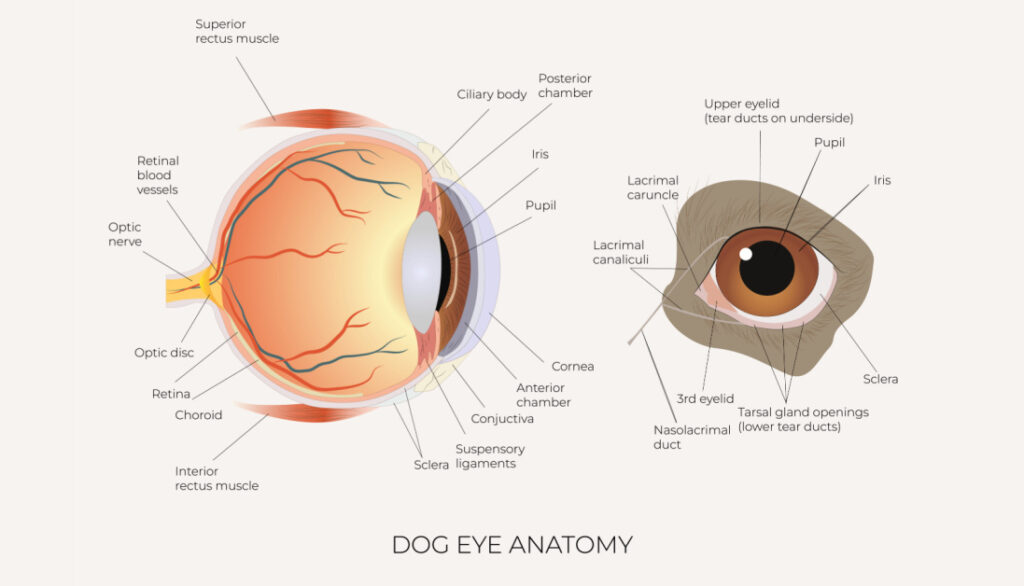
Common Eye Issues In Yorkshire Terrier
As a veterinarian, I often encounter certain eye problems that are more common in Yorkshire Terriers. Understanding these conditions can help you keep an eye out for early signs and seek timely treatment. Here are some of the most common eye health issues in Yorkshire Terriers:
1. Dry Eye (Keratoconjunctivitis Sicca)
This is a condition where the tear glands do not produce enough tears to keep the eyes lubricated. Symptoms include redness, discharge, and a constant effort to scratch or rub the eyes. If left untreated, it can lead to more serious conditions like corneal ulcers.
2. Progressive Retinal Atrophy (PRA)
PRA is a genetic condition that causes the photoreceptor cells in the eye to deteriorate over time, leading to blindness. Early symptoms include difficulty seeing in low light or at night.
3. Cataracts
Just like in humans, cataracts in Yorkshire Terriers involve clouding of the eye lens, resulting in blurry vision. You might notice a cloudy or whitish appearance in your pet’s eyes.
4. Distichiasis
This condition involves the growth of extra eyelashes from the oil glands of the dog’s eye. These extra lashes can rub against the cornea, causing irritation and discomfort.
5. Entropion
Entropion is a condition where the eyelids roll inwards, causing the eyelashes to rub against the cornea, leading to discomfort, redness, and potential vision loss if left untreated.
While these are common Yorkshire Terrier Eye Health – Conditions, it’s important to remember that early detection is crucial. Regular vet check-ups can help diagnose these conditions in their early stages, and there are many effective Solutions From Vet for these eye issues. Treatment options can vary from eye drops and ointments to surgical interventions, depending on the severity of the condition.

Nourishing Your Dog’s Vision: Essential Nutrients for Eye Health
Ensuring your Yorkshire Terrier gets the right nutrients for optimal eye health is essential for maintaining clear vision and preventing age-related issues. Natural, nutrient-rich foods and supplements can play a key role in supporting their eyesight. From vitamin A-packed freeze-dried liver treats to antioxidant-rich blueberries and targeted supplements like Eyeplex by Standard Process, there are several ways to nourish your dog’s eyes. In this section, we’ll explore how these powerful ingredients contribute to long-term vision health and overall well-being.
Eyeplex by Standard Process
Eyeplex by Standard Process is a specialized supplement designed to support your Yorkshire Terrier’s eye health with a blend of essential nutrients. Formulated with key vitamins, minerals, and antioxidants, Eyeplex helps protect against oxidative stress, supports retinal function, and promotes overall vision health. Ingredients like vitamin A, vitamin C, and zinc contribute to maintaining strong eyesight, while whole food ingredients provide additional phytonutrients for cellular protection. Adding Eyeplex to your Yorkshire Terrier’s diet can be especially beneficial for aging dogs or breeds prone to eye conditions, offering targeted nutritional support to keep their vision sharp and healthy for years to come.
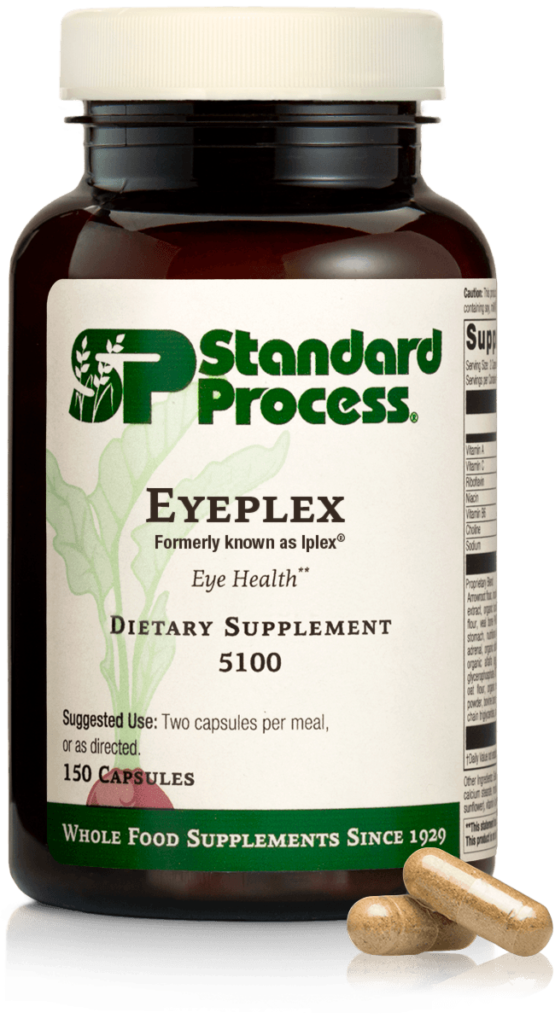
Freeze-Dried Blueberries
Freeze-dried blueberries are a powerhouse of antioxidants that can help protect your Yorkshire Terrier’s eyes from oxidative stress and age-related damage. Rich in vitamins C and E, as well as anthocyanins, these tiny but mighty berries help combat free radicals that can contribute to eye diseases like cataracts and macular degeneration. Incorporating freeze-dried blueberries into your dog’s diet provides a natural and delicious way to support retinal health, reduce inflammation, and promote overall vision longevity. Plus, they’re a low-calorie, dog-friendly treat that makes a great addition to a balanced diet for long-term eye health.
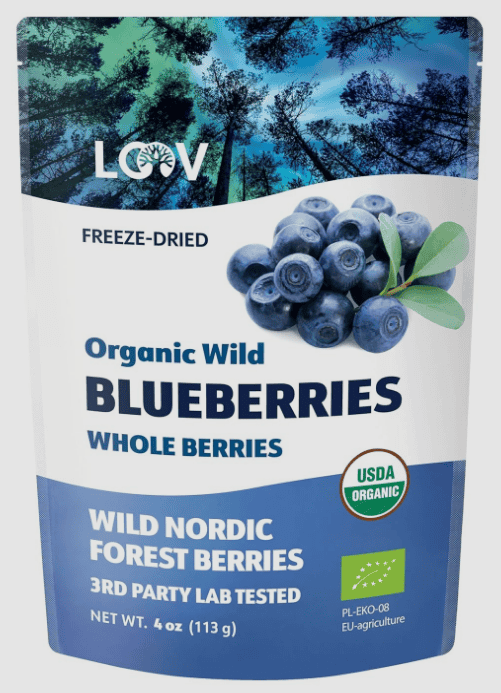
Freeze-Dried Liver
Freeze-dried liver treats are an excellent natural source of vitamin A, an essential nutrient for your Yorkshire Terrier’s eye health. Vitamin A plays a crucial role in maintaining good vision, especially in low-light conditions, while also supporting overall immune function and skin health. Since liver is rich in bioavailable vitamin A, incorporating freeze-dried liver treats into your dog’s diet provides a convenient and nutritious way to promote optimal eye function. Just be sure to feed them in moderation, as excessive vitamin A can lead to toxicity. Adding these nutrient-packed treats to your pup’s routine is a simple, tasty way to support their long-term vision and well-being!
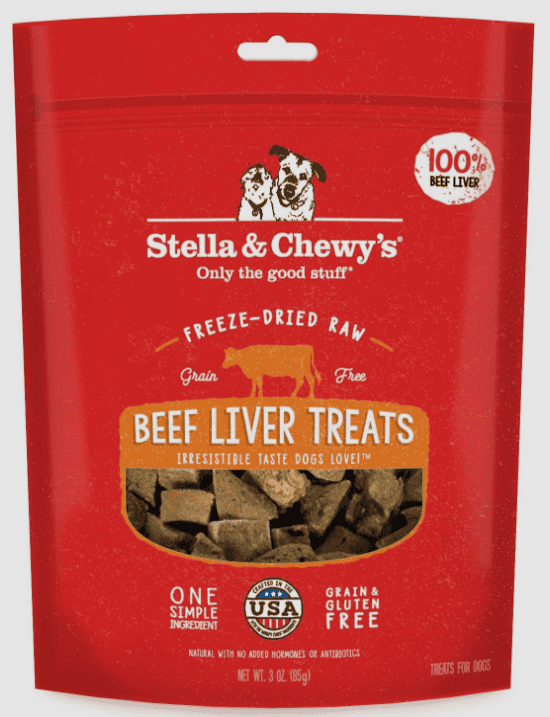
By prioritizing your Yorkshire Terrier’s eye health through a balanced diet and nutritional supplements, you can help prevent many common eye issues. These simple steps can go a long way in ensuring your pup’s eyes stay healthy and clear for years to come.
In conclusion, maintaining your Yorkshire Terrier’s eye health goes beyond regular vet check-ups. A balanced, nutrient-rich diet and the right supplements can go a long way in preventing common eye issues. Always remember to consult with a vet for personalized advice suited to your pet’s needs.
Environmental Hygiene To Reduce Eye Problems
One of the most effective ways to maintain your Yorkshire Terrier’s eye health is by ensuring a clean and safe environment. This includes monitoring the indoor air quality and being cautious about the use of sprays, diffusers, candles, and incense.
Indoor Air Quality
Yorkshire Terriers, like many small breeds, are sensitive to poor indoor air quality. Dust, smoke, and other airborne particles can irritate their eyes, leading to discomfort and potential health issues. Here are a few tips to improve the indoor air quality for your pup:
- Regular Cleaning: Regular vacuuming and dusting can significantly reduce the amount of dust and other irritants in the air.
- Air Purifiers: These devices can filter out many of the pollutants in the air. Choose one that’s designed to remove pet dander, dust, and other common allergens.
- Proper Ventilation: Ensure your home is well-ventilated. Regularly open windows to let fresh air in and stale air out.
Sprays, Diffusers, Candles, Incense
While these items can make your home smell great, they can cause problems for your Yorkshire Terrier’s eyes. The chemicals used in many of these products can cause irritation and even lead to more serious eye conditions. Here’s how you can reduce the risk:
- Use Natural Products: Opt for products made with natural ingredients. These are less likely to irritate your dog’s eyes.
- Ensure Good Ventilation: If you must use these products, ensure the room is well-ventilated to disperse the chemicals.
- Keep Out of Reach: Make sure these items are kept out of your dog’s reach to prevent accidental contact with the eyes.
Remember, your Yorkshire Terrier’s eye health is largely dependent on the environment they live in. By ensuring a clean, safe, and healthy environment, you can help prevent many common eye issues. Always consult with a vet if you notice any changes in your dog’s eyes or behavior.

Routine Yorkshire Terrier Eye Care & Maintenance
Caring for your Yorkshire Terrier’s eyes is an integral part of their overall health. Regular eye care and maintenance can help prevent the development of common eye diseases and ensure that your little friend’s eyes remain bright and healthy. Here’s how to do it:
Daily & Weekly Care & Maintenance
Consistent daily and weekly care is the key to maintaining your Yorkshire Terrier’s eye health. Start by checking their eyes every day for any signs of redness, discharge, or discomfort. If your pup is constantly scratching or pawing at their eyes, it might be an indication of an underlying issue that needs veterinary attention.
Regularly cleaning your Yorkshire Terrier’s eyes is also essential. Use a clean, damp cloth or a pet-safe eye wipe to gently remove any crust or discharge from the corners of their eyes. Be careful not to touch the eye surface directly to avoid causing any injury.
Once a week, examine your Yorkshire Terrier’s eyes in a well-lit room. Look for any changes in the eye’s appearance, such as cloudiness, color changes, or swelling. If you notice anything unusual, don’t hesitate to consult your vet.
Monitor Hair Length, Nail Length, Bath Frequency
The long, silky hair of a Yorkshire Terrier is one of their defining features, but it can also cause eye irritation if allowed to grow too long and fall into their eyes. Regularly trimming the hair around their eyes can help prevent this. You can either do this yourself with a pair of blunt-nose scissors or take your pup to a professional groomer.
Keeping your Yorkshire Terrier’s nails trimmed is also important for their eye health. Overgrown nails can lead to accidental scratches and injuries to the eye. Aim to trim your pet’s nails every 3-4 weeks.
Lastly, consider your Yorkshire Terrier’s bath frequency. While baths are necessary for overall hygiene, excessive bathing can lead to dry eyes. Try to limit baths to once a month and always avoid getting shampoo or water in your pet’s eyes. Always use a dog-specific shampoo that is gentle on their eyes.
Remember, your Yorkshire Terrier’s eyes are delicate and require regular care to stay healthy. By incorporating these steps into your pet care routine, you can help ensure that your little furball’s eyes remain clear, bright, and disease-free.
Frequently Asked Questions
1. What are common eye conditions that Yorkshire Terriers may experience?
Yorkshire Terriers are prone to various eye conditions such as cataracts, dry eye (keratoconjunctivitis sicca), glaucoma, and progressive retinal atrophy.
2. How can I prevent eye problems in my Yorkshire Terrier?
To prevent eye problems, it is important to maintain good hygiene by regularly cleaning your Yorkshire Terrier’s eyes and surrounding areas. Avoid exposing them to irritants such as smoke or chemicals. Regular visits to the vet for check-ups are also crucial.
3. What are the signs that my Yorkshire Terrier may have an eye problem?
Signs of eye problems in Yorkshire Terriers include redness, excessive tearing, discharge, squinting, cloudiness, frequent pawing or rubbing of the eyes, and changes in behavior or vision.
4. Can I use over-the-counter eye drops for my Yorkshire Terrier’s eye condition?
No, it is not recommended to use over-the-counter eye drops without consulting a veterinarian. Some eye drops may contain ingredients that can worsen the condition or be harmful to your Yorkshire Terrier’s eyes.
5. What should I do if I suspect my Yorkshire Terrier has an eye problem?
If you suspect your Yorkshire Terrier has an eye problem, it is best to consult a veterinarian as soon as possible. They can properly diagnose the issue and provide appropriate treatment or recommendations.
